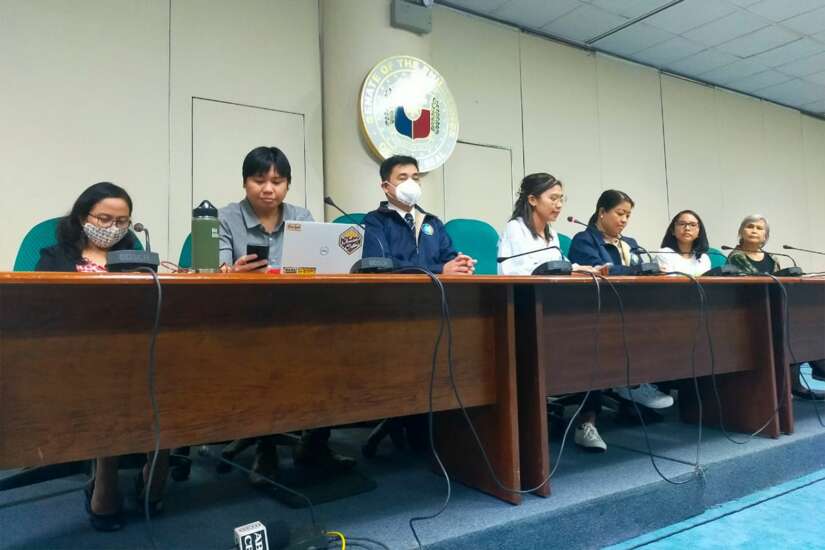EcoWaste Coalition and its member organizations together with their allies commemorate the annual Zero Waste Month today, January 23, 2023, by holding the #PlasticFreeSenate campaign, which includes activities such as a photo exhibit, documentary screening of “Ang Huling Plastic” and “The Story of Plastic,” a zero waste bazaar, and a legislative forum on waste-to-energy. Such activities aim to amplify the call to ban single-use plastics (SUPs), unmask single-use plastic production issues, false solutions, as well as highlight zero-waste businesses and mainstream zero-waste solutions.
The group kicks off the week with a photo exhibit that illustrates the alarming state of plastic pollution in the Philippines. The exhibit showcases the works of veteran photojournalists and green activists in the country today.
They also pledged support for Senator Loren Legarda’s Senate Bill 246, also known as the Single-Use Plastics Regulation and Management Act of 2022, a new step toward a comprehensive and national ban on single-use plastics with the following salient points:
- Coverage: Shall apply to the manufacture, importation, use, recycling, and disposal of all SUPs used in business, retail, and consumer transactions.
- Effectivity: After one year from the Act’s effective date, all businesses must phase out SUPs sold to consumers.
- Incentives for reuse: Consumers who bring their own reusable or recyclable containers will receive a P50 discount on food and beverage takeouts.
- Incentives for industries: Industries switching to alternatives will receive incentives from the Philippine Cooperative Code of 2008, the Barangay Micro-Business Enterprises Act of 2002, the Magna Carta for Micro, Small, and Medium Enterprises, the Omnibus Investment Code of 1987, or the Green Jobs Act of 2016.
- Public Participation: Citizens suit for the purpose of enforcing the provisions and implementing rules and regulations. Any citizen may file an appropriate civil, criminal, or administrative action with the proper court or body. Suits and strategic legal action against public participation (SLAPP) are also provided for in the Act.
The urgent campaign to ban SUPs is taking place on multiple fronts, from the national level ban to seeking corporate accountability and responding to the global call for a plastic treaty.
Further, the group explained that the bill is a timely development amid the proliferation of false solutions across the country.
Coleen Salamat, Plastic Campaigner of EcoWaste Coalition pointed out that: “As plastic production continues as usual, so do efforts to curb plastic pollution. We remain vigilant over environmental efforts that lead to greenwashing. We urge the general public to exercise vigilance over false solutions such as waste-to-energy incineration, co-processing of plastic waste in cement kilns, among others, that are not only detrimental to the environment but to people’s health.”
Parallel to this, green groups also seek to hold corporations accountable for plastic pollution. It can be recalled that in November 2022, environmentalists and consumers filed a complaint against Coca-Cola, Pepsi-Cola, Nestle, Unilever, Procter and Gamble, Colgate Palmolive, and Universal Robina Corp (URC) at the Department of Trade and Industry (DTI) Fair Trade Enforcement Bureau- Mediation and Adjudication Bureau.
Miko Aliño, Project Coordinator for Corporate Accountability of the Break Free from Plastic (BFFP) movement, asserted that: “The government should be wary of false solutions, like burning plastic waste in cement kilns, which undermine reduction efforts such as the proposed SUP ban. Corporations are likewise urged to pursue ambitious plastic reduction plans without the need for such greenwashing gimmicks.”
EcoWaste Coalition and member organizations, who are consequently part of the global BFFP movement, laud Senate Bill 246 as it could be the Philippines’ response to the global call for a plastics treaty to end plastic pollution. The Intergovernmental Negotiating Committee (INC) was tasked with drafting the global plastics treaty and held its first session last November with the mandate “End plastic pollution: Towards an international legally binding instrument.”
Marian Ledesma, Zero Waste Campaigner of Greenpeace Philippines, explained that: “Beyond generating obvious and notable benefits for people, our climate, and the environment, passing the SUPs Regulation and Management Act has become increasingly crucial because the global plastics treaty is expected to be finalized by the end of 2024.”
She emphasized that a national ban which reduces plastic production and use prepares the Philippines for the subsequent developments that come with this legally binding international instrument’s adoption. Ledesma added “more importantly, having a law in place before 2024 will allow for a just transition for all stakeholders involved as we move towards a reuse economy.”
Further strengthening the call for a national SUP ban, Miriam Azurin, Deputy Director of Global Alliance for Incinerator Alternatives (GAIA) Asia Pacific said: “The increasing interest in waste-to-energy incinerators is a dangerous and costly option for disposing of problematic waste streams like SUPs as WTE does not recycle them into energy. It is merely transformed into other forms of pollution, thus creating more problems than solutions. The bill proposes a sustainable alternative for these plastics that can’t be recycled. It contributes to a system shift—a just transition where zero waste is the norm.”
The #PlasticFreeSenate campaign is organized by EcoWaste Coalition, Global Alliance for Incinerator Alternatives, Greenpeace Philippines, Health Care Without Harm Southeast Asia, Mother Earth Foundation, and Oceana Philippines International, together with the Climate Change Commission, and the Office of Senator Loren Legarda.

